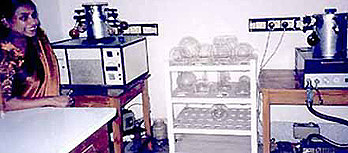SWEDISH SOUTH ASIAN STUDIES NETWORK
International Science Programme (ISP), Uppsala University
 Postal Address: Box 549, SE-751 21 Uppsala, Sweden
Postal Address: Box 549, SE-751 21 Uppsala, Sweden
Visiting Address: Dag Hammarskjölds väg 31
Web page: http://www.isp.uu.se
Key persons:
Associate Professor Lennart
Hasselgren,
Head of International Science Program (Director of International Programme
in Physical Sciences, IPIPS), phone: +46 (0)18 471 3576
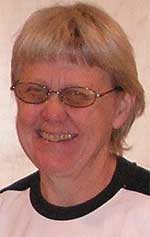
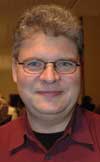 Associate
Professor Peter Sundin (photo
to the left), Deputy Head of International Science Program (Director
for the International Program in Chemical Sciences, IPICS).
Associate
Professor Peter Sundin (photo
to the left), Deputy Head of International Science Program (Director
for the International Program in Chemical Sciences, IPICS).
Peter Sundin succeeded Malin Åkerblom (photo to the right) who was in charge of IPICS for many years, but has now retired. During the period 2001-06, Dr. Åkerblom was a member of the three-member evaluation group for SASNET’s planning grants applications. More information.
The International Science Programme (ISP) has the task to
initiate and support long-term collaboration in research of foremost Swedish
institutions with institutions in a number of developing countries –
in South Asia ISP is working with Bangladesh and Sri Lanka. The purpose
is to increase the research capacity of universities and research institutes
in these countries, and also encourage regional collaboration amongst
countries of the Third World. In the task is also included support to
strengthen the local research environments.
ISP consists of three main activities
• The International Programme in the Physical Sciences, IPPS, started
in 1961. More information on South Asia related projects.
• The International Programme in the Chemical Sciences, IPICS, started
in 1970. More information on South Asia related projects.
• The International Programme in the Mathematical Sciences, IPMS,
started its programme activities in 2002 (only active in Africa).
Dr. Sundin participated in the SASNET workshop on ”The role of South Asia in the internationalisation of higher education in Sweden” held in Stockholm 28-29 November 2006, where he gave a presentation about the International Science Programme. Read Dr. Sundin’s presentation at the workshop (as a pdf-file)
IPPS:
The IPPS focuses its activities on providing assistance to create viable and independent research teams of an international standard. In the countries with which IPPS has co-operation, physics is very weak and in a stage of capacity building. Therefore, most of the projects supported by the IPPS are located at university departments. In South Asia the following projects are currently supported:
Bangladesh:
• Dept. of Physics, Bangladesh University of Engineering and Technology, Dhaka.
Project: Development of magnetic materials.• Dept. of Physics, Rajshahi University of Engineering and Technology, has an attached project supported on a not regular basis, for a project on ”Thin Films”.
Sri Lanka:
• Dept. of Physics, University of Colombo
Project 1: Atmospheric physics and lightning research.
Besides an IPPS resource Group on Atmospheric physics and lightning research has been set up at the department.
Project 2: Molecular desorption of biomolecules: Mass spectrometry applications and mechanistic studies.• Dept. of Physics, University of Peradeniya
Project: Syntheses, characterization and investigation of physical properties of technologically important new materials: Ionically and electronically conducting polymers, group II-V and III-V semiconductors and structural and functional ceramics.
IPICS:
IPICS supports a broad range of chemical research; organic, inorganic and biological; analytical, physical, synthetic and structural; basic and more applied research. IPICS also encourages interdisciplinary research, based on well-founded knowledge within the participating disciplines. One third of the support goes to regional collaboration. In South Asia the following projects are currently supported:
Professor Nilufar Nahar at the Dept. of Chemistry, Dhaka University heads an ISP supported group working with the chemistry of natural products. They try to identify the active components of traditional medicine for standardisation of these and for the development of new drugs. Professor Nahar is one of several who got their PhD after sandwich studies in Bangladesh and Sweden. Bangladesh:
• Dept. of Chemistry, Dhaka University. Contact person: Prof M Mosihuzzaman. Swedish collaborator: Dept. of Chemistry, Swedish University of Agricultural Sciences, SLU, Uppsala (Prof. Lennart Kenne).
Project 1: Chemical and biological studies of medicinal plants
Project 2: Studies of organic pollutants in food and environment• Institute of Research and Rehabilitation in Diabetes, Endocrine and Metabolic Disorders (BIRDEM), Dhaka. Contact person: Prof. Liaquat Ali. Swedish collaborator: Dept. of Medical Cell Biology, Uppsala University (Prof. Erik Gylfe)
Project: Diabetes research in BangladeshSri Lanka:
• Faculty of Medicine, Dept. of Biochemistry and Molecular Biology, University of Colombo. Swedish collaborators: Dept. of Genetics and Pathology, Uppsala University (Docent Marie Allen); and Dept. of Pharmacognosy, Uppsala University; and Dept. of Biotechnology, Lund University
Project: Capacity building in biochemistry, molecular biology, and gene technology (resource group formed).• Dept. of Chemistry, Peradeniya University. Swedish collaborators: Dept. of Environmental Assessment, Swedish University of Agricultural Sciences, SLU, Uppsala (Prof Henrik Kylin).
Project: Bioactive compounds in the control of plant diseases (resource group formed)• Dept. of Biochemistry, University of Jaffna. Swedish collaborator: Dept of Biotechnology, Lund University
Project: Biotechnology of starch and sucrose (Palmyrah) based products• Dept. of Biochemistry, University of Sri Jayewardenepura, Nugegoda. Swedish collaborators: Dept of Applied Nutrition and Food Chemistry, Lund University.
Project: Nutritional biochemistry.
IPICS also supports two South Asian research networks, namely:
• ANRAP, Asian Network of Research on Antidiabetic Plants. Presently active in Bangladesh, India, Pakistan, Nepal. More information on ANRAP.
• NITUB, Network of Instrument Technical personnel and User scientists of Bangladesh
Both networks are coordinated from the Dept. of Chemistry, University of Dhaka, Bangladesh.
Evaluation seminar on Bangladeshi project
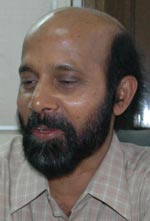 The Secretariat for Research Co-operation at the Swedish International Development Cooperation Agency (Sida), and ISP, organised a seminar on development support to science in Stockholm on Thursday 23 September 2010. The seminar was entitled ”Catalytic effects of support to research group development – examples from biomedical science in Bangladesh and Zimbabwe”.
The Secretariat for Research Co-operation at the Swedish International Development Cooperation Agency (Sida), and ISP, organised a seminar on development support to science in Stockholm on Thursday 23 September 2010. The seminar was entitled ”Catalytic effects of support to research group development – examples from biomedical science in Bangladesh and Zimbabwe”.
Dr Liaquat Ali (photo) from Bangladesh Institute of Research and Rehabilitation in Diabetes, Endocrine and Metabolic Disorders (BIRDEM) in Dhaka, Bangladesh, was supposed to give a presentation entitled ”Biomedical research as a catalyst for large scale health care and human resource development: Experience from Bangladesh”.
The research pursued by the group of Dr Ali has been directly supported by ISP from 1995 to 2008. SASNET’s Lars Eklund visited BIRDEM and Dr. Ali’s research group in 2005, read his report.
Venue for the seminar: Sida, room Asante, Valhallavägen 199, Stockholm. More information.
50th Anniversary Seminar in 2011
A one-day seminar to celebrate the 50th Anniversary of International Science Programme (ISP) at Uppsala University will be held on 26 September 2011. When it started in 1961, it was called the International Seminar for Research and Education in Physics. Over the 50 years since then, the programme has developed from a fellowship programme into a capacity building programme, not only in Physics, but also in Chemistry (since 1970) and Mathematics (since 2002). ISP gives long term support to the establishment of viable research teams in developing countries, including South Asia. Regional cooperation and networking are also important parts of the activities.
The seminar aims to highlight experiences drawn in the past 50 years from different perspectives, and to indicate the way forward.
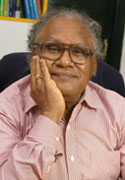 Invited speakers include Professor C.N.R. Rao (photo) from Jawaharlal Nehru Centre for Advanced Scientific Research in Bangalore, India, who will talk about ”Developing Countries in the International Year of Chemistry”; and Professor Hans Rosling, Karolinska Institutet, Stockholm, who will talk about ”ISP and the world”.
Invited speakers include Professor C.N.R. Rao (photo) from Jawaharlal Nehru Centre for Advanced Scientific Research in Bangalore, India, who will talk about ”Developing Countries in the International Year of Chemistry”; and Professor Hans Rosling, Karolinska Institutet, Stockholm, who will talk about ”ISP and the world”.
Dr Anders Granlund, Head of the Unit for Research Cooperation at the Swedish International Development Cooperation Agency (Sida); and Mr Tomas Kjellqvist, Research Manager at Blekinge Institute of Technology (BTH), and former director of the Secretariat for Research Cooperation at Sida, will also participate.
Venue for the seminar: Ihresalen,
Engelska Parken,
Thunbergsvägen 3H, Uppsala.
Full information on ISP’s seminar page.![]()
SASNET - Swedish South Asian Studies Network/Lund
University
Address: Scheelevägen 15 D, SE-223 70 Lund, Sweden
Phone: +46 46 222 73 40
Webmaster: Lars Eklund
Last updated
2011-06-09
